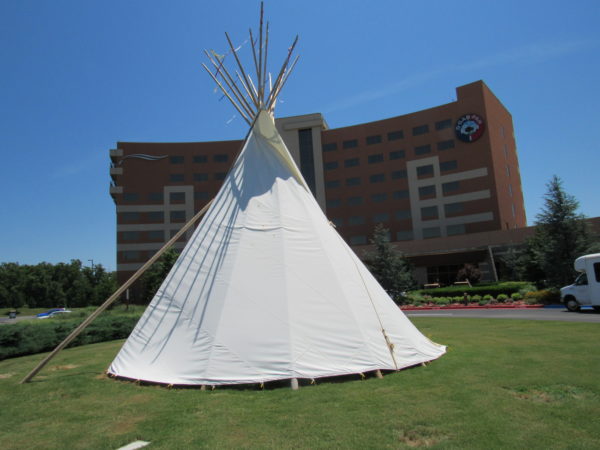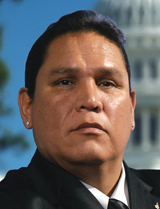
- Details
Guest Opinion
By Ernest Stevens, Jr.
With more than 33 million Americans filing for unemployment, the coronavirus has triggered the worst unemployment crisis in the history of our nation, and an economic crisis that is being compared to the Great Depression.
Indian gaming, hotel and hospitality operations nationwide shut down in March to prevent transmission of the coronavirus. Tribal governments implemented these closures in coordination with state governors and through tribal government emergency declarations.
The shutdown of the $40.6 billion Indian gaming industry equates to closing the 11th largest employer in the United States: more than 787,000 American jobs, and more than $34.7 billion in direct and indirect wages.
While much more must be done, the National Indian Gaming Association applauds recent efforts to help Tribal Governments stem the economic impacts on our communities through inclusion of Indian Country in the Main Street Lending program.
The Federal Reserve’s Main Street Loan program is for small and medium sized businesses facing economic losses and challenges due to the National COVID-19 Emergency that can’t access credit elsewhere. The Federal Reserve Board of Governors on Thursday, April 30, announced its expansion of the Main Street Loan Program to buy loans from banks that make loans to small and medium-sized businesses and a parallel program for corporate bond purchases from large businesses. Fed Chairman Powell noted the Main Street Lending Program is different from the Paycheck Protection Program: “One, these are not grants; these are loans. I don’t know that the demand will be quite as strong as it has been for the PPP. And the second thing is, we won’t run out of money. It’s not a limited pot, so there won’t be this incentive to try to get there first.”
 Ernie Stevens, Jr. - Chairman of National Indian Gaming Association
Ernie Stevens, Jr. - Chairman of National Indian Gaming Association
Small and medium size gaming operations are now eligible for the Main Street Loan Program that the Federal Reserve Bank recently updated and will soon open. While the Main Street Loan Program is not forgivable loans like the SBA Paycheck Protection Program, it does provide Tribal governments with an avenue to service existing debt or refinance obligations under much more favorable terms. The interest rate is Libor +3% for four-year loans ranging from $500,000 up to $200 Million. Companies with less than 15,000 people or $5 Billion in revenue are eligible. In the first year, loan payments are deferred.
Main Street Loans are made by private banks and then the Federal Reserve Banks purchase 85 to 95 percent of the Main Street Loans. Companies with less than 15,000 people or annual revenue of up to $5 billion are eligible. In determining eligibility for the Main Street Loans, the Federal Reserve Bank will follow eligibility changes made by Treasury/SBA under the Paycheck Protection Program, to make legal gambling operations are eligible.
Many tribal gaming operations did not meet the size requirements for the SBA PPP, so the Main Street Loan Program offers an important avenue for funding. For those Indian tribes that have participated in the SBA PPP program, and still need bridge funding, Main Street Loans will provide a new option: Participation in PPP does not bar an Indian nation from seeking a Main Street Loan.
As noted above, much more must be done to help Indian Country through the pandemic from both a health care and economic perspective.
We keep working with the Federal Government on new options for Indian nations since the National COVID-19 Emergency is still unfolding. Our Tribal Governments are adjusting to meet the new challenges of this severe economic crisis. We will continue to work closely with our Member Tribes to address the COVID-19 emergency. In the coming days and weeks, we will be working closely with Congress to develop a legislative package that provides needed health and economic resources, including another round of Coronavirus Relief for State-Local-and Tribal Governments to address lost revenues.
However, until that package comes together, we applaud even the small victories to help Indian tribes stem the economic impacts of the pandemic so that Tribal Government-owned businesses remain viable.
Ernest Stevens, Jr. is the chairman of the National Indian Gaming Association, based in Washington, D.C.
More Stories Like This
Native News Weekly (August 25, 2024): D.C. BriefsUS Presidents in Their Own Words Concerning American Indians
Two Murdered on Colville Indian Reservation
NDAA passes House; Lumbee Fairness Act Advances
NFL, Vikings to Host Native All-American Game, Youth Flag Clinic
Help us defend tribal sovereignty.
At Native News Online, our mission is rooted in telling the stories that strengthen sovereignty and uplift Indigenous voices — not just at year’s end, but every single day.
Because of your generosity last year, we were able to keep our reporters on the ground in tribal communities, at national gatherings and in the halls of Congress — covering the issues that matter most to Indian Country: sovereignty, culture, education, health and economic opportunity.
That support sustained us through a tough year in 2025. Now, as we look to the year ahead, we need your help right now to ensure warrior journalism remains strong — reporting that defends tribal sovereignty, amplifies Native truth, and holds power accountable.
 The stakes couldn't be higher. Your support keeps Native voices heard, Native stories told and Native sovereignty defended.
The stakes couldn't be higher. Your support keeps Native voices heard, Native stories told and Native sovereignty defended.
Stand with Warrior Journalism today.
Levi Rickert (Potawatomi), Editor & Publisher
